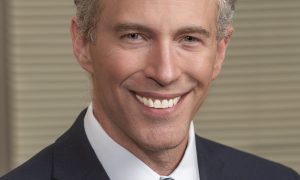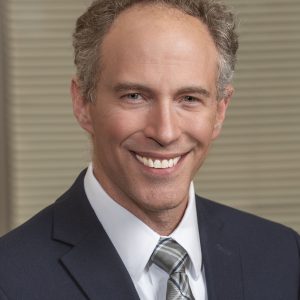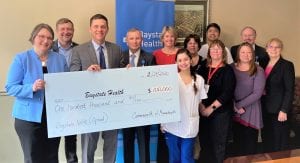
State Rep. John C. Velis, center, presents a ceremonial check for $100,000 to Baystate Noble Hospital Feb. 25 for its efforts in addressing the opioid crisis. (HOPE E. TREMBLAY/THE WESTFIELD NEWS)
WESTFIELD – Baystate Noble Hospital is making strides in combatting the local opioid epidemic, with help from area organizations and earmarks from state Rep. John C. Velis.
Velis met with some of the community and healthcare stakeholders Feb. 24 during a roundtable discussion at the Westfield hospital, which also included a ceremonial check presentation of $100,000.
Michael R. Knapik, vice president of community and government relations for Baystate Health, thanked Velis for his “passion and concern” for collaborating on ways to provide resources to those suffering from addiction.
In Fiscal Year 2019, Velis secured $50,000 for the effort and Monday presented the $100,000 check for the current year.
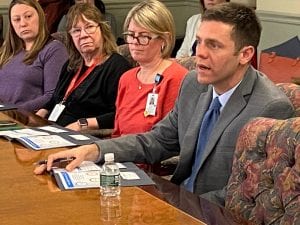
State Rep. John C. Velis Feb. 25, 2020 speaks about the opioid epidemic during a discussion at Baystate Noble Hospital. (HOPE E. TREMBLAY/THE WESTFIELD NEWS)
The discussion included input from Eliza Lake, CEO of the Hilltown Community Health Center, Kathi Cotugno, coordinator of the Coalition for Outreach Recovery and Education – CORE – and Behavioral Health Network Senior Vice President Susan West, among others.
Baystate Noble President Ronald P. Bryant noted that much of the current work was an extension of another community coalition. He said this funding furthers the mission of that group.
“This bring us together at the table to discuss the issues facing us,” Bryant said. “We need to combat the opioid crisis and work on behavioral health issues we face every day.”
Some of the funds secured by Velis will go toward integrating behavioral health and primary care, some will go toward Narcan administration training and some to outreach.
Narcan is administered immediately to a person who has overdosed to try to reverse the effects of the opiate.
Velis said since he was elected in 2014, the opioid crisis has been a priority. He recalled one of his first days as a representative when a city resident came to his office to talk about his daughter who died from an overdose.
“He showed me pictures of his daughter and kept saying ‘Does my daughter look like a heroin addict?’ over and over,” said Velis.
Velis said something he has learned is that an addicted person cannot be helped unless they want help.
“We don’t have the ability to save everybody,” he said. “The individual has to make the decision to get the help they need and we have to provide the resources.”
West said BHN sees people daily in need of recovery, and the biggest deterrent are gaps in funding for certain resources.
“Housing, employment and transportation are key issues for those who need to get into recovery,” said West. “All the help we can get to close those gaps is appreciated.”
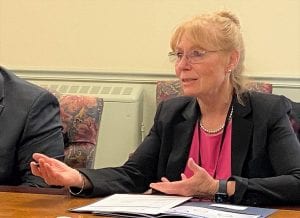
Susan West talks about the need for resources for recovery at Baystate Noble Feb. 25, 2020. (HOPE E. TREMBLAY/THE WESTFIELD NEWS)
Those seated around the tabled agreed those resources must be available to make progress. Until then, the number of overdoses will climb.
“It’s a pandemic,” said Cotugno. “Our numbers nationwide are astronomical – it’s horrendous.”
Lake said in addition to recovery resources, they have to figure out a way to “stop the problem upstream.”
In Fiscal Year 2019, Baystate Noble Hospital’s Opiod Task Force instituted substance use services including policies and procedures for the emergency department, Narcan education, case management follow-ups and certifying emergency room physicians to prescribe suboxone, which blocks the effects of opioid medication, including pain relief or feelings of well-being that can lead to opioid abuse.
Mental health professionals began providing 72-hour post discharge follow-up up calls, ongoing support, referrals, therapeutic interventions and community visits. Baystate Noble also hosted its first Community Awareness Day last May with a focus on overcoming the obstacles of the opioid crisis.



